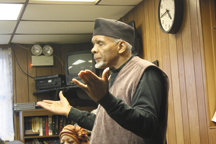Prompted by several lawsuits alleging discrimination and alleged racist abuse of workers, leaders from several out of state civil rights organizations came to Bayonne last week for meetings with Mayor Mark Smith and members of the community in an effort to resolve some of these issues.
Representatives met in the hall at the Wallace Temple A.M.E. Zion Church in Bayonne to begin developing a plan of operation for dealing with perceived racial inequities in the city, and to find common ground with the city administration for solving these issues.
“You have to have factual irrefutable data.” — Rev. Horace Sheffield III
________
Offering the services of his organization, Sheffield said funds for conducting a fact-finding public forum would be provided in order to build a body of evidence that could be used to prove to skeptical local officials that the city has a problem when it comes to hiring practices and other race-relative issues.
Generated by lawsuits
Karen DeSoto, the attorney who represents several city workers who have filed lawsuits against the city, brought the civil rights leaders into Bayonne.
She said one of the reasons she brought people together was because there has been a number of allegations over the past few years of discrimination involving Hispanics and African-Americans in Bayonne and in a variety of areas, such as conflicts with police, discrimination in-house, discrimination in employment, and other issues.
“I thought it was time to bring those issues to light because it affects all of us,” she said.
DeSoto, who contacted Rev. Sharpton and Sheffield, said that she could only take on a fraction of the discrimination complaints she has received.
Rev. Dorothy A. Patterson, the pastor of Wallace Temple, said she wanted to provide an objective place for the public meeting.
Stories will be recorded
Sheffield, however, discouraged people from telling their stories until a time when these can be documented. He said the community needed to build a case that can be presented to the city, in an effort to enlighten the city to the problem with the hopes that the alleged abuses will be addressed.
Sheffield said the purpose of the gathering at Wallace was to begin the process of gathering evidence, and to put together a network of individuals to eventually begin documentation. This will include a public hearing with a stenographer, in which individuals will be allowed to present their cases.
While many of the more than 100 people who crowded into the church’s meeting room wanted to talk about specific incidents, Sheffield said they should wait until the meeting when their reports could be recorded.
Sheffield cautioned the crowd against hyperbole, saying that the cases must be presented in a way that cannot be discredited.
“You have to have factual, irrefutable data, not ‘I think’ or ‘I feel,’ or ‘I believe,’ ” Sheffield said. “You must have specific information, and concrete data on incidents of racism. Otherwise, it is all just smoke and mirrors.”
He said this is not about raised voices, and that he will not be part of anything that does not show respect. Sheffield said he believes there should be an independent panel to evaluate the information gathered. When the information is sent to City Hall, names will be withheld to protect the people involved, Sheffield said.
“No one should be afraid about anything,” he said. “This is a different day in America, and people have a right to express whatever concerns they have about any mistreatment.”
He said that along with complaints, this committee needs to also present solutions.
Leaders met with Mayor Smith
Sen. Cunningham said that she and the others had met with Mayor Mark Smith prior to the public session at Wallace.
“The mayor said he did not know of many of the issues,” Cunningham said. “No one has come to him and said, ‘You have a problem with racism, and people have not been able to move up.’ ”
This drew moans from the audience.
Sheffield said he found some of Mayor Smith’s claims “strange” in that the mayor claimed he could not recall one case of police brutality. Sheffield, however, said the mayor seemed genuinely concerned.
“I assured him that we’re not trying to tear this town up,” Sheffield said. “No one is going to solicit people who are irrational.”
Cunningham said Smith asked to come to the meeting in the church with the community, but that Sheffield had discouraged it.
“We did agree that we will be holding a public hearing so that everyone will be able to register their complaints,” she said. “It will be recorded and taped as an official document. So people can come and say what the issues are and what the problems are.”
But she said the community has to make sure the people with the complaints actually show up for the hearing.
“If they do not come out and complain on the record, it is going to be very hard to make any changes,” Cunningham said.
She cautioned the crowd not to expect immediate change.
“It is going to have to be an ongoing dialogue, and he has agreed to that,” Cunningham said. “And he said he is willing to make whatever changes can be made.”
